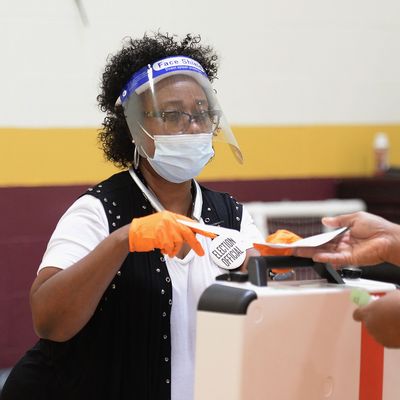
Even as Republican politicians in Washington and many other states triple down in their efforts to repeal or cripple the Affordable Care Act, voters in very red states continue to insist on taking advantage of the most “socialistic” aspect of the ACA, the optional Medicaid expansion feature.
Yesterday voters in Missouri made their state the sixth to implement Medicaid expansion via a ballot measure (in this case a constitutional amendment), and the 38th overall to expand Medicaid, as the St. Louis Post-Dispatch reported:
Ignoring pleas from Republican leaders, Missouri voters approved a plan Tuesday to expand Medicaid coverage to more than 230,000 low-income people in the state.
Missouri voted to expand its Medicaid program, as 53% of voters supported the measure….
The vote comes after repeated rejections by the GOP-controlled Legislature after the passage of the Affordable Care Act in 2010 allowed states to expand who can get coverage.
The constitutional amendment marks the latest setback for Republicans when it comes to ballot initiatives. Voters also approved a minimum wage hike and rejected a right-to-work law pushed by former Gov. Eric Greitens in 2018.
Voting on the Medicaid expansion followed a stark urban-rural divide, even though rural hospitals were arguably among the main beneficiaries. In both Kansas City and St. Louis, 88 percent of voters supported it. The pattern was similar to the one we saw earlier this summer in Oklahoma, which also narrowly approved Medicaid expansion by ballot initiative. All told, five deep-red states (Idaho, Utah, Nebraska, Oklahoma, and Missouri), plus purplish Maine, have expanded Medicaid by ballot initiative; it’s only failed once, in Montana.
As Sarah Kliff explains, the successful maneuver around Republican obstruction in the states began with a California-based union effort, dubbed the Fairness Project, to raise the minimum wage in the Golden State and in Maine. It quickly led to the first Medicaid expansion referendum — in Maine in 2017 — which right-wing governor Paul LePage waged a holy war against:
The Maine campaign succeeded, with 59 percent of voters supporting Medicaid expansion. That caught the attention of supporters in other states, who were similarly struggling to enact the program.
“I got in touch with the Fairness Project and basically asked: What would it take to have you come to Nebraska,” said State Senator Adam Morfeld, who had spent years introducing legislation to create the program. “They immediately did a poll in December 2017, and saw there was a path to victory.”
In 2018, the Fairness Project ran successful Medicaid expansion campaigns in Nebraska, Utah and Idaho.
As Kliff observes, of the 12 remaining holdout states, only four have ballot initiative options for expanding Medicaid. But there is one biggie:
Florida, which has 2.7 million uninsured residents, is the Fairness Project’s next major focus.
“We’ve been working in Florida for about two years now,” Mr. [Jonathan] Schleifer said. “It’s such a massive undertaking, but the number impacted would be the same as everywhere else combined, close to 800,000.”
He has targeted 2022 as the earliest date the Fairness Project could run a campaign there.
By then it’s possible that a Democratic administration and a Democratic Congress will have ended the threat to Obamacare in Washington — and perhaps they may even begin the process of building on it in a way that will make the state Medicaid expansion option less critical. But for now, unlikely successes like the one in Missouri are critical steps in the long struggle towards universal health care coverage.






























